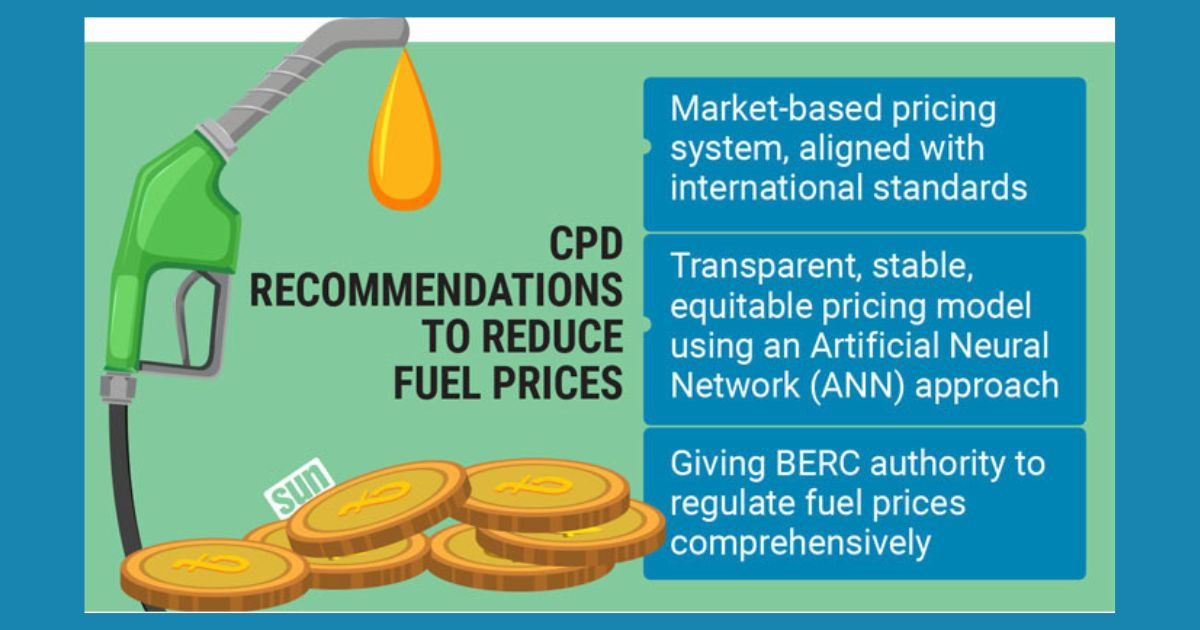Pricing reform may reduce fuel costs by Tk10-15/litre: CPD
Daily Sun Report, Dhaka
Published: 21 Nov 2024

Bangladesh can reduce fuel prices by Tk10 to Tk15 per litre if the government reforms its fuel price setting system, Centre for Policy Dialogue (CPD) has suggested.
During a dialogue titled “Market-based Fuel Pricing: Government-led Initiatives and Possible Revision” held in Dhaka on Thursday, CPD experts highlighted that the current pricing model, based on an automated system introduced in March 2024, has faced criticism due to its financial and fiscal impacts.
Under this model, fuel prices are set according to a formula designed to ease the government's fiscal burden, as part of the conditions for an International Monetary Fund (IMF) loan.
However, the formula has not been entirely well-received, and general consumers as well as business people have called for its revision.
Dr Khondaker Golam Moazzem, research director at CPD, emphasised that there is a scope of revising the fuel pricing method in a way that will both benefit consumers and eliminate the need for subsidies from the Bangladesh Petroleum Corporation (BPC).
He also said BPC is already making significant profits, and these profits could be balanced to better serve consumer interests. This change could also have a positive effect on electricity prices.
The CPD's study pointed out that a market-based pricing system, aligned with international standards, could potentially lower fuel prices by Tk10 to Tk15 per litre.
The think-tank proposed adopting a more transparent, stable, and equitable pricing model using an Artificial Neural Network (ANN) approach.
This model would help mitigate the effects of exchange rate fluctuations and other market shocks, thus providing a more predictable and fair fuel pricing system.
One of the major advantages of the ANN-based model is its ability to absorb shocks at the import stage, which would help stabilise fuel prices.
Additionally, the model would account for the socio-economic realities of the country, ensuring that the pricing system is responsive to the needs of consumers while also considering fiscal constraints.
According to CPD, this approach could make fuel prices more stable and equitable, benefiting both the consumers and the national economy.
The dialogue also included discussions on the role of the Bangladesh Energy Regulatory Commission (BERC), which has been tasked with overseeing fuel pricing. Helen Mashyat Preoty, senior research associate at CPD, stressed the importance of approving the draft regulations prepared by BERC for fuel price determination.
She called for immediate approval from the Ministry of Power, Energy, and Mineral Resources to give BERC the authority to regulate fuel prices comprehensively.
Preoty also recommended that BERC should take charge of monitoring and implementing the automated pricing model, ensuring its full transparency and accountability.
She suggested that BERC could hold regular public hearings to engage consumers and other stakeholders, ensuring that the pricing process remains open and fair.
According to Preoty, the adoption of the ANN-based model would aid in long-term energy planning. By offering predictive insights into future fuel costs, the model would enable both consumers and policymakers to make better plans for transitions to alternative energy sources. This foresight is crucial for aligning energy policies with sustainable development goals.
In his remarks, Moazzem pointed out that the current fuel pricing system is not sufficiently aligned with market dynamics and international standards.
He argued that by using a more flexible, data-driven approach, the government could create a more balanced pricing structure that would better reflect global fuel price trends while minimising the financial burden on consumers.
The dialogue also highlighted the potential benefits of a revised pricing system beyond the fuel market. By improving the pricing framework for fuel oils such as diesel, petroleum, octane, and kerosene, the government could promote energy efficiency and security.
The CPD’s proposals are seen as a way to address some of the challenges that have arisen since the implementation of the current automated pricing formula.
Since the system’s introduction, many consumers have raised concerns about the rising cost of fuel, which has contributed to higher living expenses.
The reform is viewed as a necessary step to alleviate some of these pressures and make fuel pricing more equitable and transparent.
The dialogue was attended by BPC Chairman Md Amin Ul Ahsan, BERC Chairman Jalal Ahmed, Additional Secretary of the Energy and Mineral Resources Division Khalid Ahmed, Energy Adviser at the Consumers Association of Bangladesh Dr M Shamsul Alam, Bangladesh Independent Power Producers’ Association Vice President Humayun Rashid, and others.

